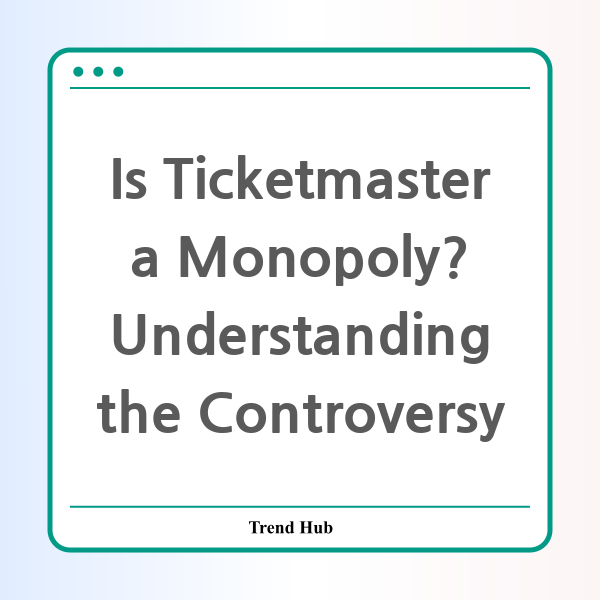* This website participates in the Amazon Affiliate Program and earns from qualifying purchases.

Is Ticketmaster a monopoly? This question has sparked heated debates recently, especially in the aftermath of events surrounding Taylor Swift's anticipated concert tour ticket sales. On November 18th, fans were gearing up for what they believed would be an exciting day—only to face disappointment when Ticketmaster abruptly canceled the general public sale. The cancellation was attributed to a combination of an overwhelming pre-sale demand and system glitches that left many fans frustrated.
For those who may not be aware, Ticketmaster is part of Live Nation Entertainment (LNE), a company that has grown to dominate the ticketing industry. The merger between Ticketmaster and Live Nation in 2010 was approved by the Department of Justice (DoJ) under the condition that certain competitive safeguards would be put in place. Yet, questions regarding competition and market control have lingered.
So, what exactly qualifies as a monopoly? In the simplest terms, a monopoly exists when a single company holds a significant market share, allowing it to control pricing and availability without competition. The current discourse suggests that Ticketmaster may hold more than just a leading position in ticket sales. According to reports, Ticketmaster previously controlled over 80% of the primary ticketing market, highlighting concerns regarding its practices and their implications on fans and artists.
While monopolies aren't illegal per se, the practices associated with them can raise antitrust concerns, particularly when they restrict competition through unfair business practices. Ticketmaster has faced accusations of utilizing its sizeable market power to impose high fees on consumers while providing subpar service. These complaints echo those raised in the 1990s when the band Pearl Jam collaborated with the DoJ to contest what they believed were anti-competitive practices.
The latest frenzy around Ticketmaster has drawn the attention of government entities, with Tennessee's Republican attorney-general and Congress expressing intent to investigate the company's behavior post-Taylor Swift ticket scandal. The Democratic chair of the Senate antitrust subcommittee has indicated that hearings will take place to explore these issues further.
One might wonder how Ticketmaster justifies its market share. Recently, LNE's chief financial officer suggested that the company’s market size is closer to 20-30%. However, this figure seems significantly lower than the majority view, indicating potential discrepancies in how market dominance is defined. This discrepancy raises questions about whether LNE is considering a broader industry classification, thus reducing its perceived market control.
What’s more, the current administration has expressed a renewed focus on preventing monopolistic behavior across various sectors, including ticketing. President Biden’s commitment to tackling monopolies has brought the ticketing industry’s practices into sharper focus, with the Federal Trade Commission (FTC) gearing up to pursue cases that could alter the competitive landscape.
For dedicated fans, the implications of Ticketmaster's actions extend beyond mere ticket availability; they reflect broader clashes in a market where competition is critical. The recent ticketing debacle has highlighted the chilling effect that limited competition can have on service quality and consumer experiences. One possible outcome of heightened scrutiny could lead to the emergence of alternative ticket vendors, fostering an environment where fans are empowered with greater choice and better service.
In conclusion, while the legal threshold for proving Ticketmaster as a monopoly remains high, the growing dissatisfaction from fans and industry stakeholders has created a fertile ground for examining the company’s practices. As investigations unfold, one can only hope that the outcome will bring about a more competitive marketplace that prioritizes the needs of consumers over monopolistic behavior.
* This website participates in the Amazon Affiliate Program and earns from qualifying purchases.